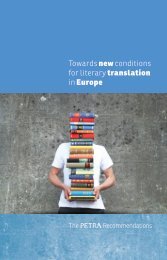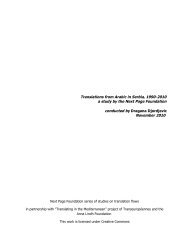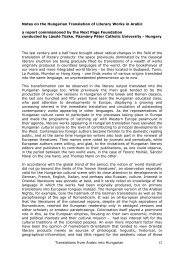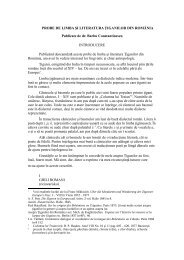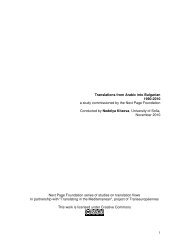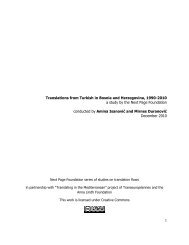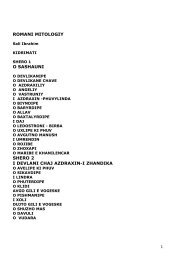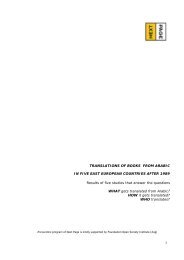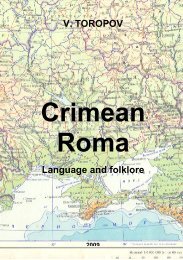the past and the present of book publishing in kurdish language in ...
the past and the present of book publishing in kurdish language in ...
the past and the present of book publishing in kurdish language in ...
Create successful ePaper yourself
Turn your PDF publications into a flip-book with our unique Google optimized e-Paper software.
CONCLUSION AND RECOMMENDATIONSAfter <strong>the</strong> explanations above, we could say that <strong>the</strong> ban on <strong>the</strong> <strong>language</strong> <strong>and</strong>censorship were <strong>the</strong> ma<strong>in</strong> problems <strong>of</strong> Kurdish writers <strong>and</strong> <strong>book</strong> <strong>publish<strong>in</strong>g</strong> for a longtime. The history <strong>of</strong> Kurdish <strong>book</strong>s <strong>in</strong> Turkey is all about oppression <strong>and</strong> censorship.S<strong>in</strong>ce <strong>the</strong> foundation <strong>of</strong> <strong>the</strong> Turkish Republic, authorities have carried out a policy <strong>of</strong>severe nationalism, aim<strong>in</strong>g at assimilat<strong>in</strong>g o<strong>the</strong>r peoples liv<strong>in</strong>g with<strong>in</strong> <strong>the</strong> boundaries <strong>of</strong><strong>the</strong> state <strong>and</strong> speak<strong>in</strong>g o<strong>the</strong>r <strong>language</strong>s. The condition <strong>of</strong> Kurdish publications <strong>in</strong>Turkey <strong>and</strong> Sweden are two different examples demonstrat<strong>in</strong>g <strong>the</strong> importance <strong>of</strong>cultural policy (100). That is to say, cultural policy can be used to both destroy orrevive a culture. Although <strong>the</strong> policy <strong>of</strong> oppression applied by Turkey h<strong>in</strong>dered <strong>the</strong>development <strong>of</strong> written Kurdish, it could not destroy <strong>the</strong> desire <strong>and</strong> <strong>the</strong> attempt topublish Kurdish <strong>book</strong>s <strong>and</strong> periodicals. In spite <strong>of</strong> <strong>the</strong> l<strong>in</strong>guistic genocide, <strong>the</strong> Kurdshave, to a great extent, managed to preserve <strong>the</strong>ir <strong>language</strong>.Naturally, Kurdish writers <strong>and</strong> publishers were <strong>in</strong>fluenced by <strong>the</strong> oppressiveconditions <strong>the</strong>y lived <strong>in</strong>. They only got <strong>the</strong> chance to become literate <strong>in</strong> <strong>the</strong>ir mo<strong>the</strong>rtongue as adults long after <strong>the</strong>y became literate <strong>in</strong> one- even more- foreign<strong>language</strong>(s). The number <strong>of</strong> <strong>book</strong>s <strong>in</strong> Kurdish has grown after <strong>the</strong> lift<strong>in</strong>g <strong>of</strong> <strong>the</strong> ban<strong>and</strong> it will be <strong>in</strong>creas<strong>in</strong>g <strong>in</strong> <strong>the</strong> future. However, l<strong>in</strong>guistic genocide must end for <strong>the</strong>number <strong>of</strong> readers <strong>and</strong> <strong>the</strong> sales to <strong>in</strong>crease. The state must support <strong>the</strong>development <strong>of</strong> <strong>the</strong> Kurdish <strong>language</strong> which must be studied at school as <strong>the</strong><strong>language</strong> <strong>of</strong> education.None <strong>of</strong> <strong>the</strong> Kurdish publishers <strong>in</strong> Turkey have <strong>the</strong>ir own pr<strong>in</strong>t<strong>in</strong>g house.However, <strong>the</strong> Swedish experience has shown that <strong>the</strong> ownership <strong>of</strong> a pr<strong>in</strong>t<strong>in</strong>g houseby Kurdish publishers will have a positive impact on Kurdish <strong>book</strong> <strong>publish<strong>in</strong>g</strong>.One <strong>of</strong> <strong>the</strong> greatest problems <strong>of</strong> Kurdish publishers is distribution. It is notenough to write <strong>and</strong> pr<strong>in</strong>t <strong>book</strong>s but <strong>the</strong>y must reach <strong>the</strong> readers. However,distribution <strong>and</strong> market<strong>in</strong>g <strong>of</strong> Kurdish <strong>book</strong>s are still unpr<strong>of</strong>essional, done byamateurs not only <strong>in</strong> Turkey but <strong>in</strong> Europe, too. For example, <strong>the</strong>re is still nonetwork for distribut<strong>in</strong>g <strong>book</strong>s <strong>in</strong> Kurdish. The solution <strong>of</strong> <strong>the</strong>se problems will havea positive impact on sales.One <strong>of</strong> <strong>the</strong> greatest problems <strong>of</strong> Kurdish literature I can see today is <strong>the</strong> lack <strong>of</strong>serious criticism. There is no survey on <strong>the</strong> read<strong>in</strong>g habits <strong>of</strong> readers <strong>of</strong> Kurdishliterature ei<strong>the</strong>r although such <strong>in</strong>formation would be very important for literature, <strong>book</strong><strong>publish<strong>in</strong>g</strong> <strong>and</strong> libraries. It is known that national characteristics <strong>in</strong>fluence <strong>the</strong> waypeople read as well as gender, class, pr<strong>of</strong>ession <strong>and</strong> life experience (101). “Ongo<strong>in</strong>gethnical <strong>and</strong> national conflicts require a new approach to <strong>the</strong> connection betweenliterature <strong>and</strong> identity.” (102)Kurdish publishers who wish to <strong>in</strong>crease sales should consider all this <strong>and</strong>develop new strategies.46



